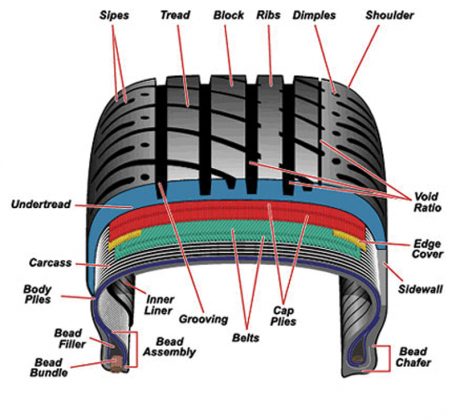
Finding the best RV trailer tires is essential for rolling down the open road, feeling the wind in your hair, and embracing the freedom of the RV lifestyle. None of this would be possible without reliable tires to keep you safe and steady on your travels.
In this guide, we’ll explore everything you need to know about finding the perfect tires for your home on wheels, ensuring every adventure is as smooth as a freshly brewed cup of campfire coffee.
This Post Is All About Best RV Trailer Tires
Understanding RV Trailer Tires
The Heart of Your RV’s Journey
Just as a quality pair of cowboy boots is crucial for comfort and support, the right tires are vital for your RV’s performance. Understanding the composition of a tire can help you make informed choices for safety and comfort on the road.
Composition of a Tire
- Rubber Compounds: The outer layer of the tire is made from specialized rubber that provides flexibility and grip. Higher-quality compounds enhance durability and performance under various weather conditions.
- Steel Belts: Located beneath the tread, steel belts add strength and help maintain the tire’s shape. They provide resistance to punctures and improve handling stability.
- Tread Patterns: The design of the tread affects traction and performance. Aggressive patterns are suited for off-road conditions, while smooth patterns offer better fuel efficiency on highways.
What Makes a Good Tire
- Durability: Quality materials resist wear and tear, extending the tire’s lifespan.
- Traction: Effective tread patterns enhance grip on different surfaces, ensuring safety in various conditions.
- Stability: Tires that maintain their shape and performance during sharp turns provide a smoother and safer ride.
What Makes a Bad Tire
- Worn-Out Tread: Insufficient tread depth leads to decreased traction, particularly in wet or slippery conditions.
- Damage or Punctures: Cracks, bulges, or punctures can compromise tire integrity, increasing the risk of blowouts.
- Poor Quality Materials: Tires made from inferior compounds can wear out quickly and may not perform reliably.
Investing in high-quality tires with the right composition is essential for ensuring a safe and comfortable RV journey. Regular inspections and timely replacements will help maintain optimal performance on your travels.
Types of RV Trailer Tires
When it comes to RV trailer tires, understanding the different types and classifications is crucial for ensuring safety, performance, and longevity on your adventures. Not all RV tires are created equal; each type is designed with specific activities and terrains in mind.
All-Season Tires:
All-season tires are versatile options suitable for a variety of conditions. They provide decent performance in many weather situations, making them ideal for those who use their RVs year-round. These tires are designed to offer a balance between dry and wet traction and are generally a good fit for RV park camping where roads are paved.
Radial Tires:
Radial tires are typically recommended for most RV trailers due to their longer tread life, improved fuel efficiency, and smoother ride. They feature steel belts that provide better handling and stability, especially at highway speeds. Radial tires are perfect for travelers who frequent established campgrounds and RV parks.
Bias-Ply Tires:
Bias-ply tires are an older technology and are generally less common for RVs nowadays. They have a stiffer sidewall, which can provide better durability on rough terrains, making them suitable for off-road exploration. However, they tend to wear out faster and can produce a noisier ride compared to radial tires.
Off-Road Tires:
For those who enjoy off-grid camping and venturing onto unpaved trails, off-road tires are essential. These tires often have a deeper tread pattern and a narrower width, which enhances traction on rugged surfaces. They are designed to withstand tough conditions like mud, sand, and rocky paths, making them perfect for adventure seekers.
Winter Tires:
If you plan on camping in colder climates, winter tires are a must. These tires are specifically engineered to handle low temperatures and icy roads. They feature a softer rubber compound that remains flexible in cold conditions, providing better grip. If you frequently camp in snowy areas, investing in a set of winter tires will enhance safety and performance.
Specialized Tires:
Some RV owners may opt for specialized tires designed for specific applications, such as heavy-duty or extra load tires. These tires are built to carry heavier loads and provide additional durability for larger RVs or those carrying extra gear.

When selecting the best RV trailer tires, consider the types of adventures you plan to embark on. Think about the terrain you’ll be navigating, the weight of your RV, and the conditions you expect to encounter.
Choosing the right tires tailored to your activities will not only enhance your driving experience but also contribute to the overall safety and performance of your RV. Remember, properly maintaining your tires with regular checks on pressure and tread will also go a long way in ensuring a safe journey on the road.
RELATED RV POST: Ultimate Guide To The Best Batteries For Travel Trailer
Key Features To Consider
Load Range
The load range is vital for supporting heavy loads. It indicates the maximum weight a tire can safely carry. Selecting a tire with the appropriate load rating ensures that it can handle the weight of your trailer without risk of failure, providing peace of mind during transport.
Gross Vehicle Weight Rating (GVWR)
Understanding the GVWR of your trailer is essential. This rating helps you choose tires that meet or exceed the weight capacity of your vehicle. Properly matched tires prevent overloading, which can lead to tire blowouts and unsafe driving conditions.
Tread Design
The tread design significantly impacts tire performance across various road conditions. A tire designed for long distances may have a different tread pattern than one meant for sharp turns. Choosing the right tread design ensures better traction, reduces road noise, and enhances overall handling.
Tire Composition
The materials used in tire construction affect durability and performance. Tires made from high-quality rubber compounds can offer greater resistance to wear and tear, prolonging their lifespan. Additionally, consider whether the tire has protective features like puncture resistance, which can be crucial for off-road conditions.
Longevity and Reliability
Assessing a tire’s expected lifespan is crucial for long-term use. Reliable tires maintain performance over time and reduce the need for frequent replacements. Look for tires with warranties or proven track records to ensure you are making a sound investment for your trailer.
By carefully evaluating these key features, you can select the right tires that maximize safety, performance, and reliability for your trailer.
Vehicle Tires vs. Trailer Tires: Key Differences and Identification
When gearing up for a road adventure, it’s crucial to understand the fundamental differences between vehicle tires and trailer tires, as choosing the right set of tires plays a pivotal role in ensuring safety and performance on your travels.
Vehicle tires are primarily designed for traction and steering on road surfaces, with a focus on providing a smoother ride and exceptional comfort for passengers. They use a radial construction that highlights their ability to handle high speeds and varying weather conditions with ease, making them an excellent choice for daily commuting and long distances.
In contrast, trailer tires are specifically designed to support heavy loads and maintain stability—essential for camper trailers, fifth wheels, and tent trailers. They often feature bias ply construction for their ability to manage heavier loads with a narrower tread width that enhances fuel efficiency and load capacity.
Trailer tires are built to withstand the unique stresses of bearing heavier weights, focusing on load range and maximum pressure, rather than the passenger comfort emphasized by vehicle tires. Key signs of a reliable tire for trailers include models like special trailer tires (ST), designed for durability and peace of mind.
When examining the condition of your tires, identifying whether they are designed for your vehicle or trailer is essential. Check the tire’s sidewall for specific markings, such as ‘LT’ for light truck tires or ratings for maximum load. Ensuring the fitment of the appropriate trailer tires helps in avoiding tire failure and prolonging the lifespan with better traction and excellent tread life, especially under challenging conditions like sharp turns or high heat.
Understanding these differences not only improves road safety but also enhances your overall travel experience, giving you the freedom to embrace the open road without worries.
Maintenance Tips for RV Trailer Tires
The Backbone of Safe Travels
Regular basis maintenance of your RV tires is as vital as checking the condition of your tires before each trip. Ensure the tire pressure is correct, as underinflation or overinflation can lead to tire failure. Check the age of the tires regularly and replace them when needed.
Step-by-Step Tire Care
- Inspection
- Regularly check for visible damage, wear, and tear. Look for cracks, punctures, or uneven tread wear.
- Pressure Check
- Tire pressure should be checked before each trip. Adjust to the recommended maximum pressure according to the owner’s manual.
- Storage Solutions
- Proper storage is crucial when your RV is parked. Use tire covers to protect against weather conditions and keep them off the ground to prevent flat spots.
- Safety Supplies for Emergencies
- Always be prepared with a car jack that matches the weight of your trailer, a cross iron or crowbar for lug nuts, and an anti-flat gel or foam to temporarily fix a flat tire. Proper preparation ensures you’re ready for any situation on the road.
FAQs about RV Trailer Tires
Common Questions, Clear Answers
- What is the difference between radial and bias tires?
Radial tires have layers of fabric with steel belts, making them durable and suitable for long distances. Bias tires are made with layers overlapping each other, offering better traction for off-road conditions.
- How often should I replace my RV tires?
Check the condition of your tires regularly and replace them every 5-7 years, even if they appear to be in good condition.
- What are the signs of tire failure?
Bulges, cracks, and excessive wear indicate potential tire failure. If you experience vibrations or swaying while driving, inspect your tires immediately.
Conclusion
Choosing the right set of tires for your travel trailer is as important as the destinations you plan to explore. The right tires ensure a smoother ride, better fuel efficiency, and peace of mind on every road trip. We hope this guide has equipped you with the knowledge needed to make the best choice for your RV adventures.
We’d love to hear about your experiences on the open road. Feel free to share your stories or ask further questions in the comments. And keep an eye out for updates on the best RV trailer tires to keep your adventures rolling smoothly!
Happy trails and safe travels!
